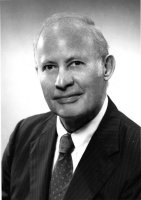- By Herson Funeral Home
- Obituaries
 Print
Print  Kenneth Holston Myers (Ken), long-time Ithaca N.Y. resident passed away peacefully on February 1, 2008. Ken is survived by his three children, Jim, Susan and Jon and his six grandchildren, who reside in Boulder, Colorado; Redmond, Washington; and San Rafael, California. Ken was a devoted husband, father and grandfather and found great joy and nourishment in his marriage and family. Ken's beloved wife, Bee, whom Ken lovingly referred to as his "soul mate", passed into eternity, January 13th, 2006.
Kenneth Holston Myers (Ken), long-time Ithaca N.Y. resident passed away peacefully on February 1, 2008. Ken is survived by his three children, Jim, Susan and Jon and his six grandchildren, who reside in Boulder, Colorado; Redmond, Washington; and San Rafael, California. Ken was a devoted husband, father and grandfather and found great joy and nourishment in his marriage and family. Ken's beloved wife, Bee, whom Ken lovingly referred to as his "soul mate", passed into eternity, January 13th, 2006. Ken's life reflects his belief that one can do what one puts one's mind to. Ken loved the book intended for young children, "The Little Engine That Could". The story's message is: "I think I can, I think I can". Ken's life is characterized, in large part, by Ken's indomitable will to succeed and contribute.
Ken and his family lived in Illinois, Japan, California, Massachusetts, before finding their true home in Ithaca, New York in 1973. The Ithaca community became very dear to Ken, Bee and the Myers family. Ken wrote in 1975, "We have arrived. We are only too glad to spend all four seasons right here in our home overlooking Cayuga Lake".
Ken contributed greatly to the Ithaca community. Such contributions included his service as President of Citizens Savings Bank, President of the Cayuga Lake Intermunicipal Water Commission, Founder and President of Ithaca Memorial Society, President of Ithaca Housing Authority, Board member of Ithaca City School District Board of Education, and member of Ithaca Rotary Club, City Club of Ithaca, and the First Congregational Church of Ithaca.
Ken's pursuit of an Engineering degree from the Illinois Institute of Technology was cut short by two years due to the onset of World War II. He enlisted in U.S. Naval Reserve in 1938. His Reserve unit was mobilized in 1940. Ken's primary service in the War was aboard the destroyer, USS Madison, on which he served as the ship's Chief Engineer and Lieutenant Commander, until the War ended in 1945. The USS Madison was awarded five combat stars for her courageous service in European-African-Middle Eastern Campaigns, including courageous service in the invasion of Southern France in August of 1944.
After the War, Ken finished his college degree at Harvard in 1947, graduating with a B.A. in American Government. He thereafter attended the Harvard Business School, class of 1949. He thereafter returned to the city of Chicago, where he had spent the majority of his childhood. He elected to return to school and attended Northwestern University, where he was granted a Ph.D. in Business Administration University in 1956. His primary courses of study in the Doctorate program included Economics, Industrial Management and Operations Management. He authored and published several books including his thesis which was titled, "Design for Digging, the First Seventy-Five years of the Bucyrus-Erie Company". He also authored numerous scholarly articles and case studies appearing in a number of scholarly Business Journals.
Ken became full Professor at Northwestern in the School of Business just three years after completing his Ph.D. In 1959, Ken split time between his professorship at Northwestern University and his post as Program Director for the Japan Productivity Center in Tokyo. The Center was associated with the University of Tokyo. There he developed the first Japanese Executive Program for Presidents and Directors of major Japanese corporations.
Ken later served as visiting full professor at University of Southern California School of Business, where he was responsible for the Executive Development Programs. In 1966, Ken took the position of Dean of the School of Business at Southern Illinois University (SIU) at Edwardsville, where he was responsible for the development of graduate and undergraduate programs in Business Administration. While serving at SIU he also was Chairman of the Federal Home Loan Bank of Chicago.
Ken's consulting and government service as Chairman of the Federal Home Loan Bank of Chicago from 1968-1970 led to his decision to leave academia and accept a position to become President of the Federal Home Loan Bank of Boston, where he served from 1970 to 1973. Ken and Bee concluded in 1973 that their family may find greater fulfillment in a smaller community. Thus it was fortuitous that Ken was approached by the Board of Citizens Savings Bank located in Ithaca, N.Y. The Bank was seeking to replace the outgoing President, who was retiring. Ken accepted the position and served until his retirement in 1985.
Ken will be remembered by his loved ones for creating a good life for his family. His children will further remember him for his empathy for those who are underserved by their communities, for his progressiveness, his long range thinking, his questioning of and not infrequent dissatisfaction with the status quo, his memory, the precision with which he used language, his expansive knowledge and interest in the social sciences, law, business, medicine, history, philosophy, religion, anthropology and other fields of study. His friends will remember him for his far-ranging intellect and kindness. The community will remember him for his compassionate action directed to those less fortunate.
A Memorial Service will be held on Sunday, February 10th, at 2 p.m. at the First Congregational Church in Ithaca, New York. In lieu of flowers, donations can be made to Hospicare of Tompkins County, or to the First Congregational Church of Ithaca. Please share thoughts, condolences, and memories by sending email to This email address is being protected from spambots. You need JavaScript enabled to view it..


